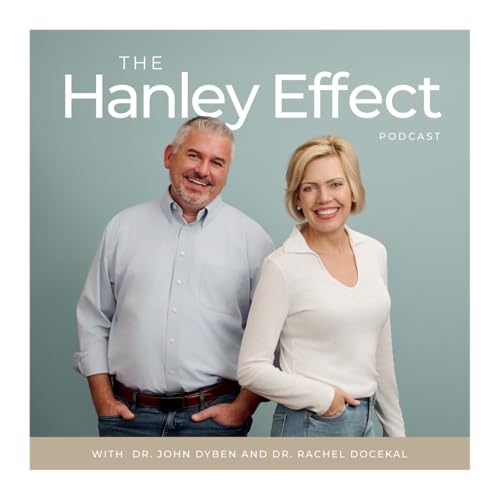In this trauma-informed episode of The Hanley Effect, Dr. John Dyben and Dr. Rachel Docekal welcome Vidya Nair, MSW, LCSW, and returning guest Lyanne Azqueta, LMHC, NCC, MAC, to explore a perspective that can change everything: addiction as an adaptation, not a moral failure. Together, they unpack how early experiences shape the nervous system, how “survival mode” becomes a lifelong blueprint, and why healing requires more than abstinence, it requires safety, connection, and new pathways in the brain.
Vidya shares how her early work with homeless children in India shaped her clinical lens and why the core human need is the same across all ages: to feel safe. Lyanne adds practical clarity around the brain’s role in trauma responses, how dysregulation takes us “offline,” and why substances can feel like instant relief. The episode also highlights what sets Hanley apart: a culture rooted in trauma-informed care, organizational humility, and a commitment to treating the “why” beneath the addiction.
Episode Highlights* Addiction as Adaptation: Why substances and compulsive behaviors often begin as survival tools developed in response to trauma and chronic unsafety.
* Trauma Lenses & “Schemas”: How childhood experiences shape the way we interpret the world, like wearing “glasses” that color everything we see.
* The “Adaptive Child” & the “Wise Adult”: Understanding why we don’t “get rid” of our inner child and what it really means to heal and re-parent those wounded parts.
* The Body Keeps the Score: How trauma lives in the nervous system, resurfaces through triggers, and can drive reactive patterns long after the danger is gone.
* Neuroplasticity & New Pathways: A memorable metaphor: the old coping route is a worn path, recovery is learning to clear a new one, again and again.
* Trauma-Informed vs. Trauma Therapy: The difference between being trauma-informed as a culture (admissions, advocates, first contact) and providing specialized trauma treatment.
* EMDR Readiness: Why EMDR can be transformational, but only when a patient has enough stability and support to safely reprocess trauma.
* Recovery as Connection: How true recovery moves from object-centered living (substance as primary relationship) to relationship-centered living rooted in presence, trust, and meaning.
* A message of hope: If you’re struggling, or love someone who is, this episode offers compassionate truth: it’s not your fault, and you don’t have to do this alone.
Memorable Takeaways* “Addiction is not a moral failure.” It’s often the nervous system doing what it learned to do to survive.
* You’re not responsible for the first thought, but you are responsible for what comes next. Healing is learning to pause and choose a different response.
* Connection regulates. Sustained recovery is built through connection with self, others, community, and meaning.
* Trauma work isn’t an excuse for behavior; it’s an explanation. Understanding the “why” can reduce shame and open the door to change.
About Our GuestsVidya Nair, MSW, LCSW, is the Clinical Director of Hanley Center’s women’s services, including Headwaters and Casa Flores, Hanley’s specialized perinatal program. She brings a deep trauma-informed lens, a background in play therapy, and a passion for building safety and healing for both mothers and families.
Lyanne Azqueta, LMHC, NCC, MAC, is a Hanley Foundation Board Member and full-time volunteer counselor who has spent decades working in addictions and trauma. A returning guest on The Hanley Effect, Lyanne is known for her compassionate, relational approach and her commitment to helping patients build lasting connection-centered recovery. Watch Lyanne's previous episode here: https://youtu.be/nhNh0yIpKlY
Resources & SupportTo learn more about Hanley Center’s programs, visit
 Feb 25 202633 m
Feb 25 202633 m Feb 18 202634 m
Feb 18 202634 m Feb 11 202631 m
Feb 11 202631 m Feb 4 202633 m
Feb 4 202633 m 27 m
27 m 28 m
28 m Jan 14 202628 m
Jan 14 202628 m 33 m
33 m
